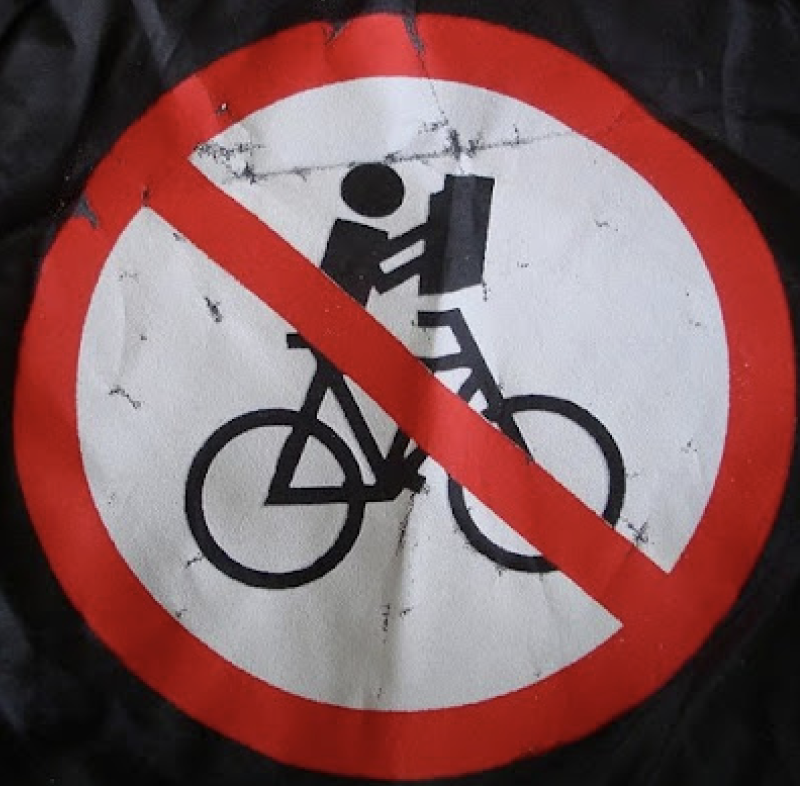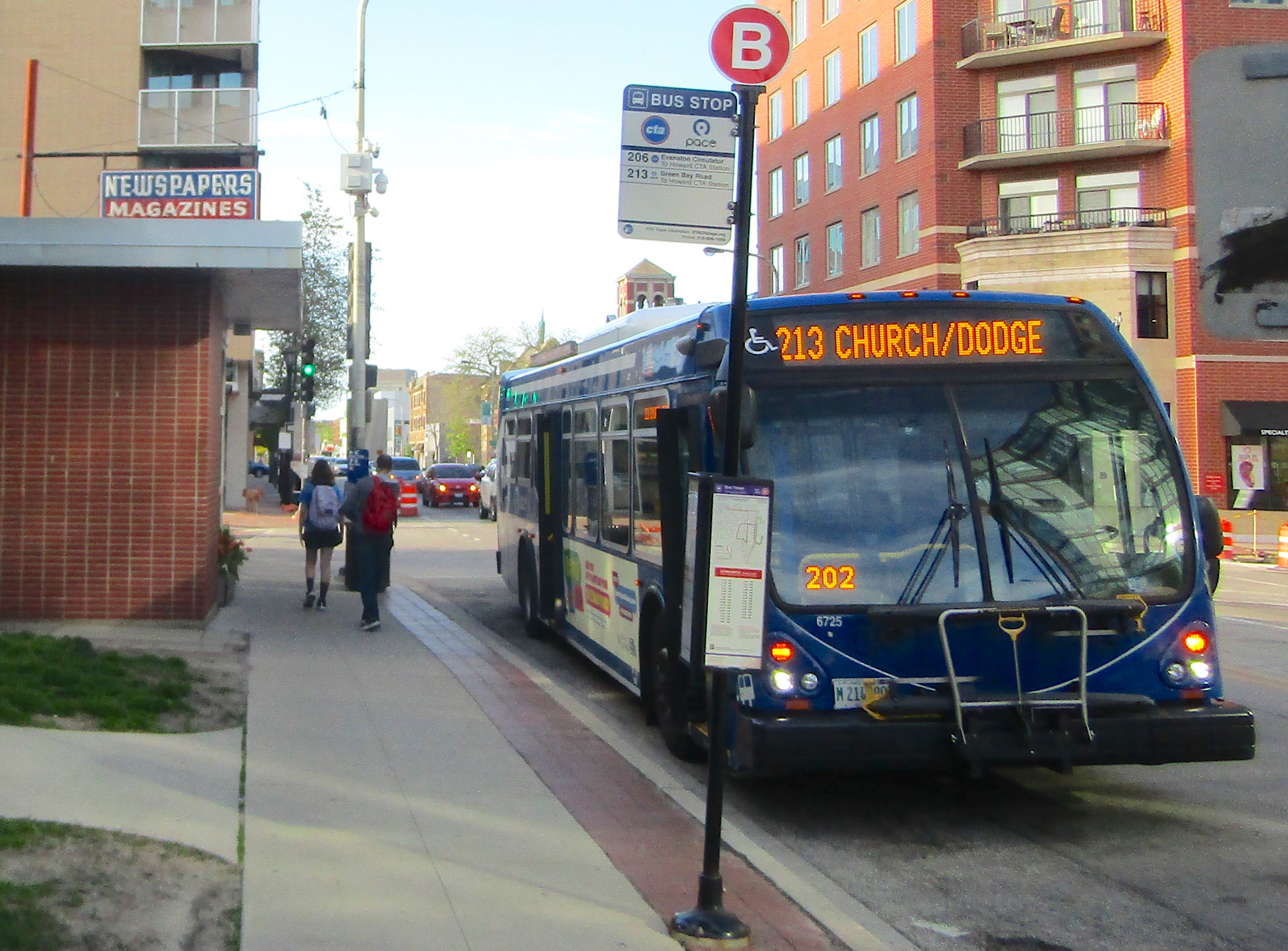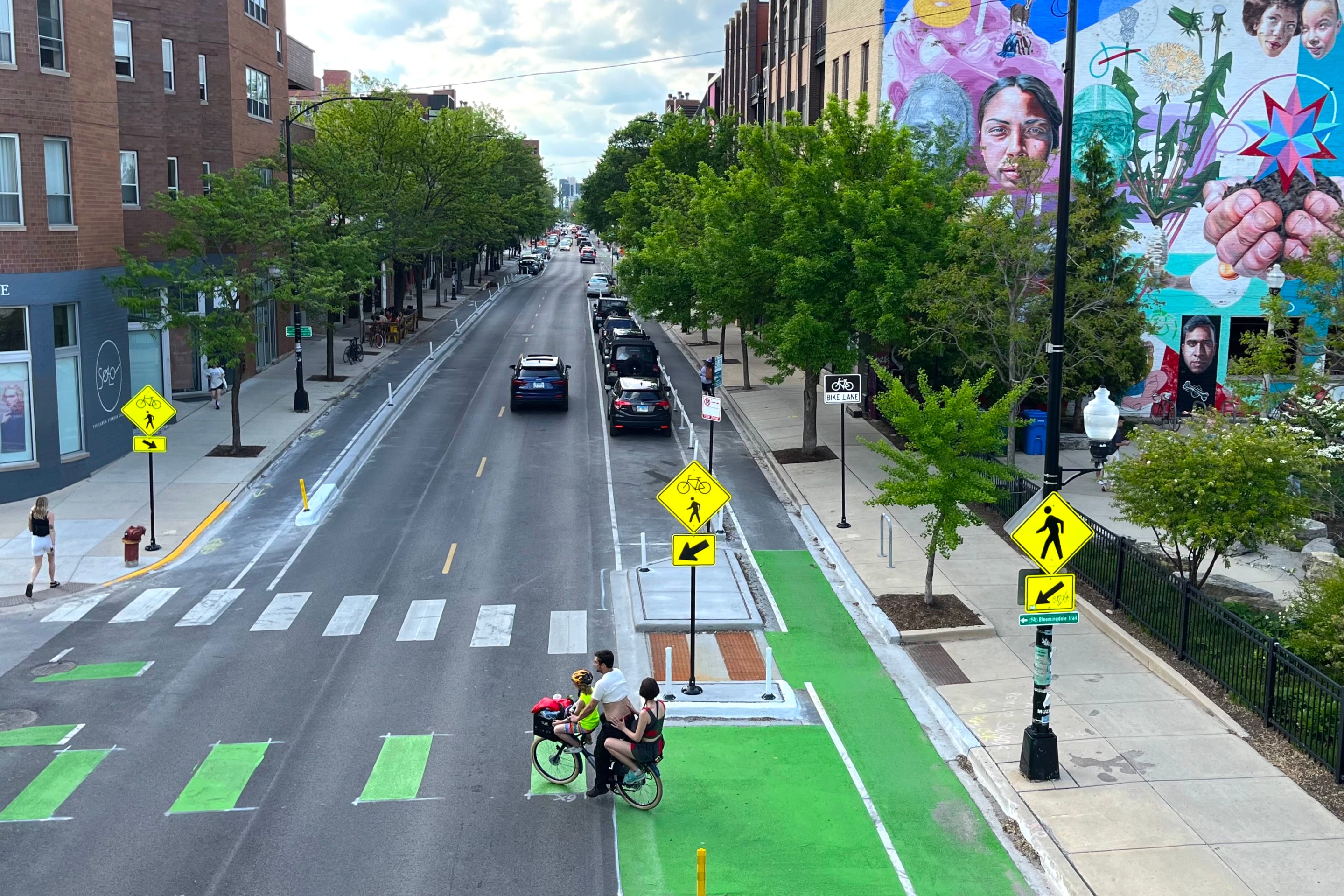CDOT Unveils E-Divvy Design, Debunks Uber’s “Fake Propaganda” at City Hall Hearing
10:35 PM CDT on March 28, 2019
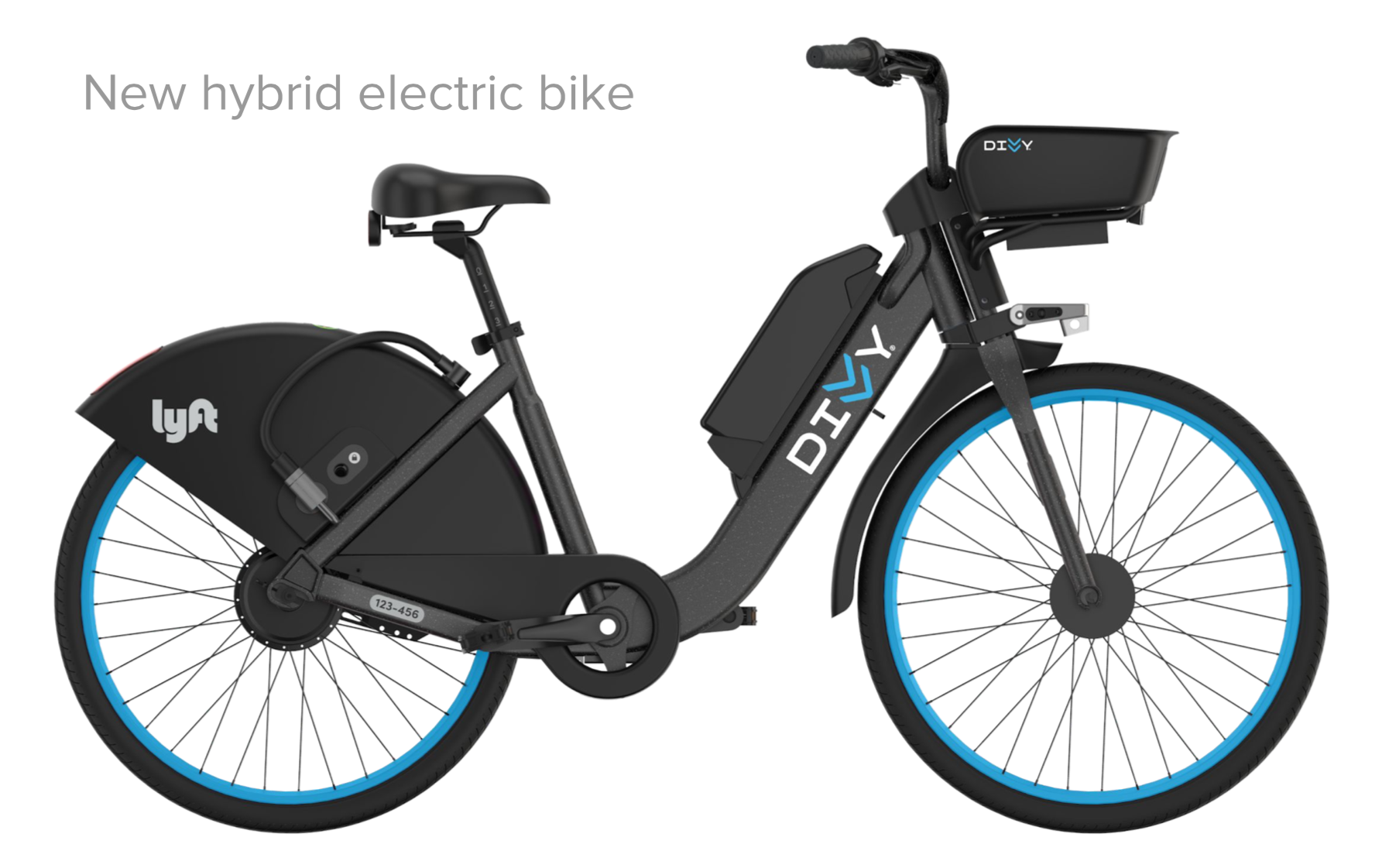
The new electrical-assist bike design.
At today's Committee on Pedestrian and Traffic Safety hearing on the Lyft/Divvy contract amendment, city transportation officials gave a preview of what the new electrical-assist Divvy bikes will look like, and tried to clear up what they called "myths" about Uber/JUMP's competing bike-share proposal. During the public comment period, community members made passionate arguments for and against the Divvy expansion and sponsorship deal.
On March 12 Mayor Rahm Emanuel announced the proposal to amend the city's existing contract with Lyft, the concessionaire for the city-owned Divvy system to add 10,500 more bikes and expand the network citywide by 2021. Read the details of the contract amendment here.
Since then, Lyft's arch-enemy Uber, which owns the dockless bike-share company JUMP, has launched a campaign to kill the Divvy deal. Back in December Uber offered to deploy 20,000 dockless bikes and 20,000 electric scooters in Chicago, claiming it could achieve citywide coverage by May 2019, a timeline Chicago Department of Transportation chief Rebekah Scheinfeld recently called "laughable."
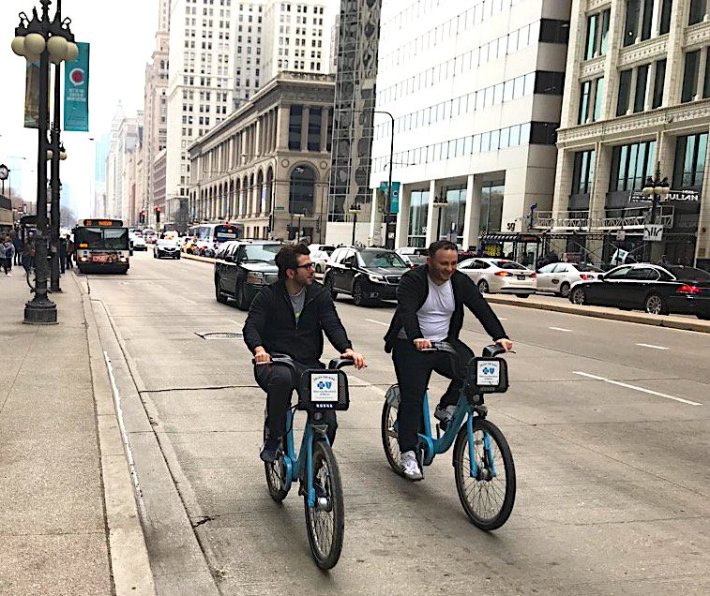
Uber has been buying ads, and launched the anti-Divvy/Lyft website PumpTheBrakesChicago.com, featuring misleading and false statements about the two proposals. Uber even paid the local news and culture website The TRiiBE to produce news-story-like coverage that serves as lobbying propaganda for the corporation.
As such, city transportation officials came to today's informational hearing at City Hall armed with information to counter some of Uber's more spurious claims. The safety committee will vote on the contract amendment at its next meeting on April 8 at noon. If the deal passes in committee, the full City Council will vote on it on April 10.
Before the hearing CDOT officials distributed a handout called "Myths vs. Facts on Uber's Misleading Bike-Sharing Proposals." Here's a summary of the key arguments:
Myth: The city turned down a $450 million investment from Uber. CDOT notes that Uber's offer included no direct revenue for the city, with that figure mostly representing the company's expenditure to buy and operate a total of 40,000 dockless bikes and electric scooters, which they could pull out of the city at any time. In contrast, the Lyft deal, which doesn't include scooters, would feature a $50 million investment in a system that Chicago would own and control, plus a guarantee of at least $77 million in revenue to the city over nine years. The city would also get to keep the hardware for no cost after the nine years is up.
Myth: Uber's plan would provide citywide service much faster than the Divvy expansion. CDOT notes that Uber has never operated a system anywhere near this large and would simply drop off 40,000 mobility devices (in the unlikely event that they can actually bring anywhere near that many to Chicago within a couple of months) with little or no input from residents.
Myth: The city is trying to force the Lyft deal through via a "no-bid contract." CDOT points out that there was a competitive bid process for the Divvy contract in 2012, before the system launched the following year. While the amendment would expand the scope of the existing contract, it wouldn't increase its duration.
Myth: The contract amendment is analogous to another parking meter deal. CDOT notes that the remainder of the contract is nine years, not 75 like the hated meter deal. Unlike the parking contract, the city would retain ownership of the Divvy network; have control over prices and service quality; and continue to gain revenue from the system.
Myth: Uber's proposal was the only one that included discounted memberships for low-income residents and a cash payment option. CDOT points out that the deal includes $10 million to expand the existing Divvy for Everyone $5 annual membership program, which allows cash payments. It also includes an adaptive bikes program and job programs for youth and ex-offenders.
"Don't let Uber deceive you with their fake propaganda," CDOT's handout warns.
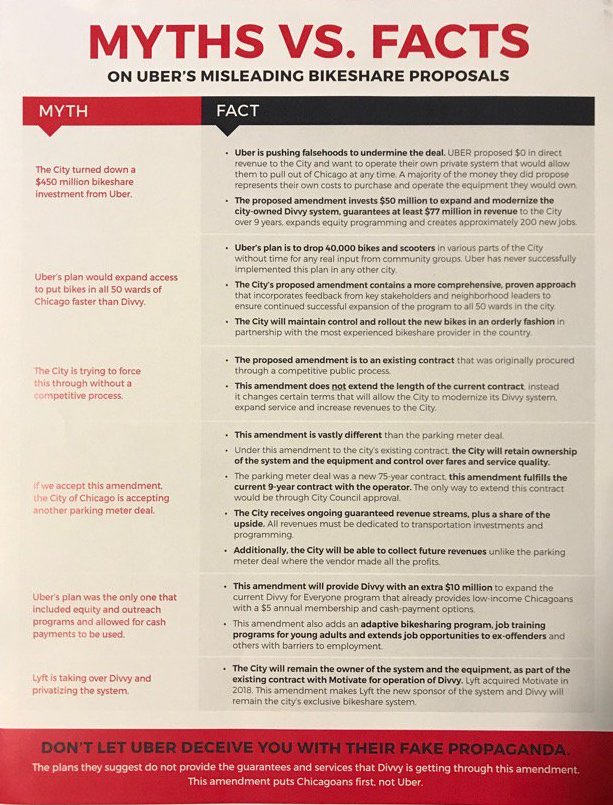
During the hearing, Scheinfeld elaborated on the details of the deal and the motivation for it. "Every year we have this same conversation with some of you" about expanding the system to serve the rest of the city, she said. She noted that $36 million in mostly federal funds was invested to build the current Divvy system, and argued that since federal grants for sustainable transportation "have dried up" under the Trump administration, it makes sense to leverage private sector funds to achieve citywide coverage.
Scheinfeld talked about some details of the contract that haven't been widely discussed before. While Lyft would replace Blue Cross Blue Shield of Illinois as the title sponsor and get its logo on the bikes, Blue Cross would have the right of first refusal for any complementary sponsorship opportunities.
Lyft will sell ads on the station panels and share revenue with the city. Lyft gets to use 20% of the station panel impressions to promote its brand, but at least half of those ads have to promote multi-modal transportation, not just Lyft's car-based ride-hailing services. Chicago gets to use 5% of the ad panels for PSAs.
The commissioner noted that the contract amendment would have multiple benefits for Chicago's bottom line, discussed in the chart below, such as increasing the city's annual ad sales and sponsorship income, while removing the financial burdens of paying for operating losses and the Divvy for Everyone program.
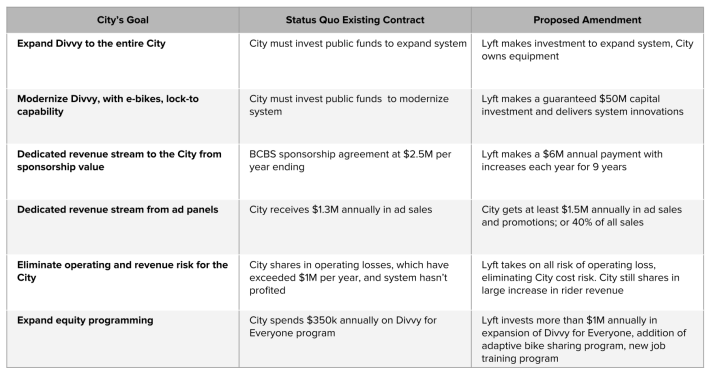
"We think this is a great deal, and we wouldn't be bringing it before you unless we thought it was something that was too good to pass up," Scheinfeld said. It must be noted that the commissioner has used similar language to describe Elon Musk's dubious O'Hare Express scheme, so it's crucial for aldermen and the public to thoroughly scrutinize the contract amendment before it's approved. Check out the document here. We'll provide some more analysis of the amendment soon.
Scheinfeld also provided a sneak preview of what the new electrical-assist, dockless-option Divvy bikes and docking/recharging stations will look like. They have a classy, black paint job, although they'll be harder for drivers to spot than the bright blue traditional cycles. The e-bikes will have GPS in the rear fender to make it easier to track them down if they go missing, and a built-in cable lock will provide users with the option of ending their trip at a bike rack instead of a station. Presumably there will be incentives to park at a station, such as ridership credit. People who've been griping for years about the front racks on Divvy bikes, which aren't very versatile, will be pleased to see that the e-bikes include a more functional front basket.
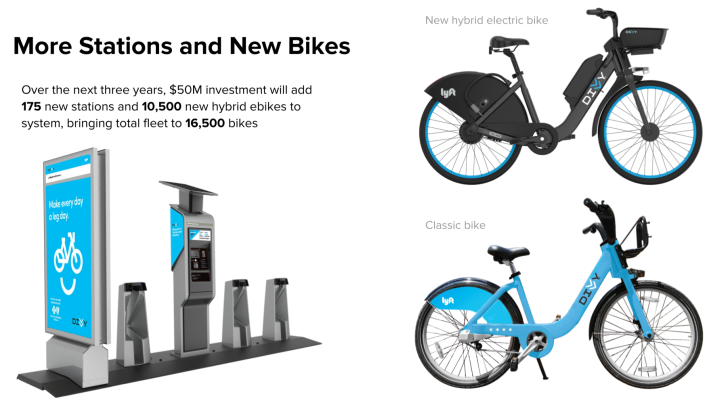
CDOT plans to focus the 2019 expansion of the system on the Far South Side, where last year's dockless bike pilot took place. Citywide expansion will wrap up by the end of 2021, possibly sooner. CDOT promises e-bikes and traditional bikes will be distributed evenly throughout the system. The department also plans to integrate Divvy into the Ventra mobile app by the end of this year, and make a combined CTA/Divvy Ventra fare card option available by the end of 2021.
Afterwards, aldermen on the committee were given the opportunity to question Scheinfeld. Committee chair Walter Burnett asked what CDOT had learned from last year's dockless pilot. "There was a lot of enthusiasm, but also a lot of concern that stations were the way people wanted to go," she responded. Far South alderman Anthony Beale later referred to the pilot as a "total disaster" with "bikes all over the place," although locals I've talked to, such as Beverly-based cycling advocate Anne Alt, said bike clutter and vandalism didn't seem to be a major problem.
2nd Ward alderman Brian Hopkins asked if it was necessary to give Lyft exclusive rights to operate bike-share in Chicago. Scheinfeld responded that, due to concerns about redundancy and over-saturation, public confusion and an inconsistent level of service, CDOT decided it was best to stick with having one, city-owned system.
During the public comment period, Commissioner Karen Tamley from the Mayor's Office for People With Disabilities, voiced support for the deal, noting that offering hand-cycles, three-wheeled recumbent bikes, and tandems will give wheelchair users, people with limited trunk stability, and folks with vision impairments the opportunity to ride a bike.
Several Divvy employees who are members of a transportation workers union spoke in favor of the contract amendment, stating that their work is enjoyable and fairly compensated, with good benefits. "We like our jobs and want to keep them," said one.
However, 20th Ward aldermanic candidate Reverend Andre Smith, who participated in yesterday's City Hall press conference against the deal, used his preaching skills to passionately testify against the amendment. "Enough is enough," he said. "We cannot let the city of Chicago continue to make deals that do not support the residents."
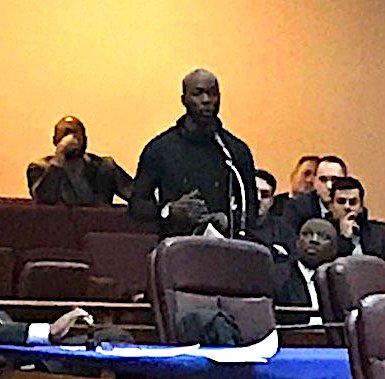
"Pump the brakes," seconded former 7th Ward aldermanic candidate Jedidiah Brown, quoting the name of the Uber website verbatim. "Open it up, don't allow [Lyft] to get an exclusive deal... Global cities need a variety of options."
Although both men's testimony echoed Uber's talking points, press event organizer and community advocate Tim Brown told me yesterday that the company wasn't involved with staging the presser.
Another Black clergyman also spoke out in favor of Uber's counter-proposal. "Uber has been a strong partner in the community," he said. "More investment is greater investment."
Active Transportation Alliance spokesman Kyle Whitehead read the group's letter to Burnett voicing support for the deal on the grounds that it's important for Chicago's bike-share system to remain under public control. Active Trans is encouraging residents to sign the letter and send it to their alderman.
A woman representing Experimental Station and Blackstone Bicycle Works said she's excited about the youth job-training component of the contract, since both of her daughters have graduated from Blackstone's bike education programs. She said that the Lyft deal, which will include Divvy mechanic training programs taught at West Town Bikes and possibly Blackstone, "will allow youth to develop skillsets that will translate into livable wages immediately... this is a ready, turnkey solution that our communities deserve."
Transportation researcher Matthew Jaques read an endorsement of the Lyft plan on behalf of DePaul's Chaddick Transportation Institute, which has studied the Divvy system. "We believe the agreement will radically improve the trajectory of bike-share in Chicago."
Here's a full list of organizations and reps that have written letters of support for the Lyft/Divvy deal.
- Garfield Park Community Council, Mike Tomas
- Quad Cities Development Corporation, Rhonda McFarland
- Active Transportation Alliance, Ron Burke
- Illinois Hispanic Chamber of Commerce, Jaime di Paulo
- Chaddick Institute, DePaul University, Joseph P. Schwieterman
- Urban Transportation Center, UIC College of Urban Planning and Public Affairs, Dr. P.S. Sriraj
- RTA, Leeanne Redden
- CMAP, Joe Szabo
- MPC, Mary Sue Barrett
- Safer Foundation, Victor Dickson
- Blackstone Bikes/Experimental Station, Connie Spreen
- West Town Bikes, Alex Wilson
- Chicago Cook Workforce Partnership, Karin Norington-Reeves
- Beverly Area Planning Association, Susan Flood
- Shared-Use Mobility Center, Sharon Feigon
- Shirley Ryan Ability Lab, Derek Daniels
- UCAN, Daisy Lynn Mertzel, Youth Development Coach
- Ron Singer, South Loop resident
- Chicago State University
- North Lawndale Employment Network, Ana Encarnacion
- Dare2tri, Keri Serota
In addition to editing Streetsblog Chicago, John writes about transportation and other topics for additional local publications. A Chicagoan since 1989, he enjoys exploring the city on foot, bike, bus, and 'L' train.
Stay in touch
Sign up for our free newsletter
More from Streetsblog Chicago
Since COVID, Pace ridership has fared better on major corridors and in north, northwest suburbs than in south, west ‘burbs
The suburban bus system's top five busiest routes largely maintained their ridership rankings.
Due to incredible support from readers like you, we’ve surpassed our 2023-24 fundraising goal
Once again, the generosity of walk/bike/transit boosters is fueling our reporting and advocacy.
